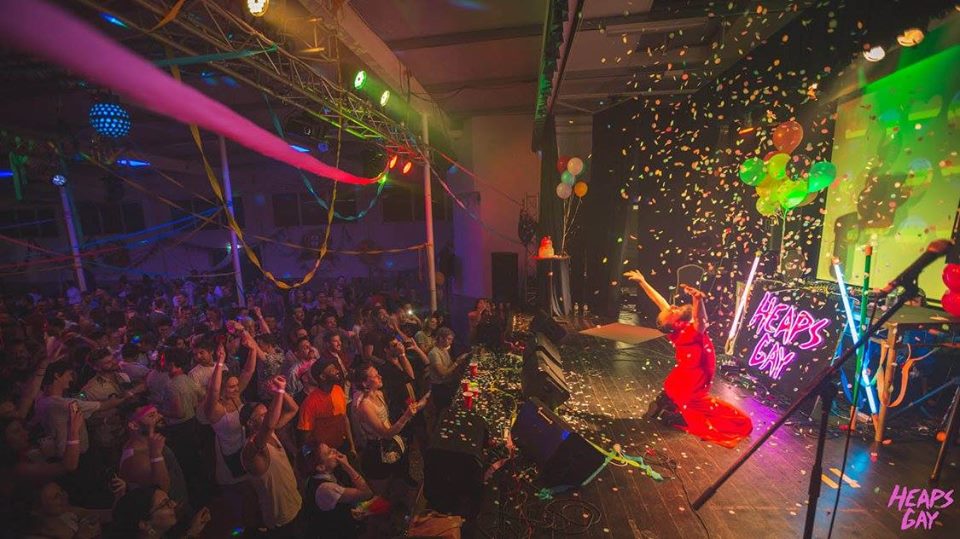Are Sydney’s dancefloors inclusive enough?

Sydney is a city of contradictions. It’s home to the Southern Hemisphere’s largest Gay and Lesbian Mardi Gras celebration but some of its western suburbs touted a no vote as high as 73% in last year’s dreaded same-sex marriage plebiscite.
Comparatively, the city has a reputation of incubating some of the most successful and critically acclaimed musical acts in Australian history but, since 2014, has been languishing under draconian lockout laws that have so far seen 176 venues close their doors for good.
How much do these two issues intertwine and how do we make Sydney’s dancefloors a safe, welcoming and fun place for as many people as possible?
Community
Loren Granich is one of the creative minds behind A Club Called Rhonda, a pansexual party in LA that has garnered international attention for being a safe space where everyone can enjoy a bloody good night out.
“It started off very innocently. It essentially came from a desire for myself, who is a straight man, and Gregory [Alexander, co-founder], who is a gay man, and us being best friends to have a place where we could have all of our friends together,” Granich tells TMN.
Granich will make his first visit to Australia in a couple weeks as a speaker at Sydney’s Global Cities After Dark conference where he’ll be discussing the importance of an inclusive dancefloor and how to spread the word worldwide.
“I would say that the thing that I learned is the importance of creating community nightlife. It’s great to go to a club and hire a DJ and people might or might not show up, but where things really start to happen, is when you focus not on selling tickets but focus on creating a community,” says Granich.
“Not saying that we all need to change the world, but if you want to do something that shows the true potential of what nightlife can do and how it can bring people and a city together, focus on the community. I think that that’s where you can start doing some big things in your city.
“I’m speaking to any kind of aspiring nightlife impresario or whoever wants to start doing things in this space.”
Locality
There’s no shortage of LGBTIQ+ events in Sydney but it wasn’t always that way as Heaps Gay founder and producer Kat Dopper explains, “I remember when I first started Heaps Gay five years ago. The scene was very different, the LGBTQIA scene was very segregated.
“Gay pubs on Oxford Street, random lesbian nights in Newtown but nothing that I felt were inclusive and catering for everyone in our community.
“We have seen the closing of institutions, the death of lesbian bars, the closing of gay clubs and the birth of a ‘queer scene’, which involves many promoters creating spaces which focus on the music and the vibe and everyone’s welcome.”
However, this change into a more homogenous scene has thrown up its own problems.
“Since marriage equality has passed, and maybe because of the changing nightlife scene post lockouts, queer parties are “on trend, cool” and what comes with that, is ensuring we are inclusive but also still creating that safe space for our community,” says Dopper.

Image via Heaps Gay Facebook
“So it can be hard to navigate that at the door, especially when now we are all working in the same venues and different events (both lgbt+ and not) happen on different nights.”
POOF DOOF director Anthony Hocking recalls a collective sigh of relief from the community following the successful yes vote and the blossoming of more grassroots events that skirt around Sydney’s restrictions.
“With the ever-hardening nightlife laws in Sydney, this has really forced parties to think more creatively about how they can run significant, meaningful, inclusive events whilst still operating within the confines of the law,” Hocking tells TMN.
“We’ve specifically noticed the evolution of smaller, more engaging events run by committed artistic operators whose core focus is to surprise and delight with theming, decor and incredible performance acts.”
Improvement
Both Hocking and Dopper are on the same page at what is needed to make Sydney’s nightlife even more accepting – education.
“I think dance floor ethics are important – educating people on ‘consent’ so that people can feel safe in spaces and on dance floors,” says Dopper.
“Calling out curators and promoters who aren’t thinking about diversity when they curate lineups – diversity promotes inclusivity.”
Hocking praises the improvements made to the scene over the last couple of years but is firm on where the scene needs to pull up its socks.
“The continued education of all venue staff and door security is essential – whether they’re working at a specifically LGBQTI+ venue or not,” says Hocking.
“These individuals are responsible for the inclusion and safety of all patrons whilst attending events and its important they are well informed, mature, respectful and responsible.”
Granich, ultimately sees the heightened interest in improving queer events and their overall visibility as the key to creating a more accepting society overall.
“We are the gateway to the gay community for a lot of straight people. Even if they don’t know it when they come. They end up making friends and dancing and laughing, and I think for all the talk that you can do about making people accept equality or changing perception there’s nothing better than sharing a drink and laughing and dancing with somebody,” says Granich.
“I think that there’s a lot of approaches that you could take to creating a more equal world, and I think that the Rhonda approach is just one of them where it’s let’s throw everybody in a box and have them sweat together.
“That’s my personal favourite way to crack open this thing.”
Loren Granich will be presenting his talk ‘Building Inclusive Dancefloors’ at Sydney’s Global Cities After Dark conference on November 13. For more information, head to the official website.






























